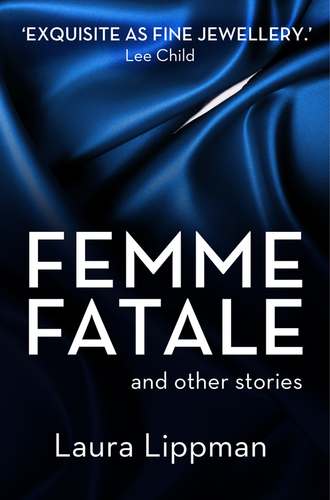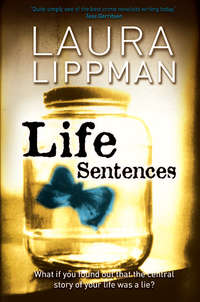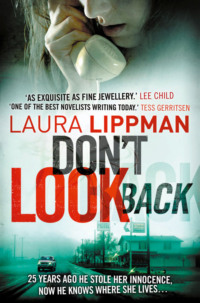
Полная версия
Femme Fatale and other stories
“You think so? Then sue me in Montgomery County courts. Your neighbors in LeisureWorld will probably love reading about that in the suburban edition of the Washington Post.”
“I’ll quit,” she said.
“Go ahead,” Bryon said. “You think you’re the only lonely old lady who needs a little attention? I’ll put the wig and the dress on some other old bag. My films, my company, my concept.”
“Some concept,” Mona said, trying not to let him see how much the words hurt. So she was just a lonely old lady to him, a mark. “I sit in a room, a young man rings my doorbell, I end up having sex with him. So far, it’s been a UPS man, a delivery boy for a florist, a delivery boy for the Chinese restaurant, and a young Mormon on a bicycle. What’s next, a Jehovah’s Witness peddling the Watchtower?”
“That’s not bad,” Bryon said, pausing to write a quick note to himself. “Look, this is the deal. I pay you by the act. You don’t want to do it, you don’t have to. I’m always scouting new talent. Maybe I’ll find an Alzheimer’s patient, who won’t be able to remember from one day to the next what she did, much less try to hold me up for a raise. You old bitches are a dime a dozen.”
It was the “old bitches” part that hurt.
WHEN MONA’S SECOND HUSBAND’S FORTUNE had proved to be largely smoke and mirrors, she had learned to be more careful about picking her subsequent husbands. That was in the pre-Internet days, when determining a person’s personal fortune was much more labor-intensive. She was pleased to find out from a helpful librarian how easy it was now to compile what was once known as a Dun and Bradstreet on someone, how to track down the silent partner in Bryon White’s LLC.
Within a day, she was having lunch with Bernard Weinman, a dignified gentleman about her own age. He hadn’t wanted to meet with her, but as Mona detailed sweetly what she knew about Bernie’s legitimate business interests—more information gleaned with the assistance of the nice young librarian—and his large contributions to a local synagogue, he decided they could meet after all. He chose a quiet French restaurant in Bethesda, and when he ordered white wine with lunch, Mona followed suit.
“I have a lot of investments,” he said. “I’m not hands-on.”
“Still, I can’t imagine you want someone indiscreet working for you.”
“Indiscreet?”
“How do you think I tracked you down? Bryon talks. A lot.”
Bernie Weinman bent over his onion soup, spilling a little on his tie. But it was a lovely tie, expensive and well made. For this lunch meeting, he wore a black suit and crisp white shirt with large gold cuff links.
“Bryon’s very good at … what he does. His mail-order business is so steady it’s almost like an annuity. I get a very good return on my money, and I’ve never heard of him invoking my name.”
“Well, he did. All I did was make some suggestions about how to”—Mona groped for the odd business terms she had heard on television—“how to grow your business, and he got very short with me, said you had no interest in doing things differently. And when I asked if I might speak to you, he got very angry, threatened to expose me. If he would blackmail me, a middle-class widow with no real money, imagine what he might do to you.”
“Bryon knows me well enough not to try that,” Bernie Weinman said. After a morning at the Olney branch of the Montgomery County Public Library, Mona knew him pretty well, too. She knew the rumors that had surrounded the early part of his career, the alleged but never proven ties to the numbers runner up in Baltimore. Bernie Weinman had built his fortune from corner liquor stores in Washington, D.C., which eventually became the basis for his chain of party-supply stores. But he had clearly never lost his taste for the recession-proof businesses that had given him his start—liquor, gambling, prostitution. All he had done was live long enough and give away enough money that people were willing to forget his past. Apparently, the going price of redemption in Montgomery County was five million dollars to the capital fund at one’s synagogue.
“Does Bryon know you so well that he wouldn’t risk keeping two sets of books?”
“What?”
“I know what I get paid. I know how cheaply the product is made and produced, and I know how many units are moved. He’s cheating you.”
“He wouldn’t.”
“He would—and brag about it, too. He said you were a stupid old man who was no longer on top of his game.”
“He said that?”
“He said much worse.”
“Tell me.”
“I c-c-can’t,” Mona whispered, looking shyly into her salade niçoise as if she had not made four adult films under the moniker “Sexy Sadie.”
“Paraphrase.”
“He said … he said there was no film in the world that could, um, incite you. That you were … starchless.”
“That little SOB.”
“He laughs at you, behind your back. He practically brags about how he’s ripping you off. I’ve put myself in harm’s way, just talking to you, but I couldn’t let this go on.”
“I’ll straighten him out—”
“No! Because he’ll know it was me and he’ll—he’s threatened me, Bernie.” This first use of his name was a calculated choice. “He says no one will miss me and I suppose he’s right.”
“You don’t have any children?”
“Just stepchildren, and I’m afraid they’re not very kind to me. It was hard for them, their father remarrying, even though he had been a widower for years.” Divorced for two years, and Mona had been the central reason, but the kids wouldn’t have liked her under any circumstances. “No, no one would miss me. Except my fans.”
She let the subject go then, directing the conversation to Bernie and his accomplishments, the legitimate ones. She asked questions whose answers she knew perfectly well, touched his arm when he decided they needed another bottle of wine, and, although she drank only one glass to his every two, declared herself unfit to drive home. She was going to take a taxi, but Bernie insisted on driving her, and accompanying her to the condo door, to make sure she was fine, and then into her bedroom, where he further assessed her fineness. He was okay, not at all starchless, somewhere between a sturdy baguette and a loaf of Wonder bread. She’d had worse. True, he felt odd, after the series of hard-bodied young men that Bryon had hired for her. But this, at least, did not fall under the category of fetish. He was seventy-three and she was sixty-eight-passing-for-sixty-one. This was normal. This was love.
Bryon White was never seen again. He simply disappeared, and there was no one who mourned him or even really noticed. And while Bernie Weinman was happily married, he had strong opinions about how his new mistress should spend her time. Mona took over the business but had to retire from performing, at least officially, although she sometimes auditioned the young men, just to be sure. Give Bryon credit, Mona thought, now that she had to scout the coffee shops and grocery stores, recruiting the new talent. It was harder than it looked and Bryon’s instincts had been unerring, especially when it came to Mona. She really was a wonderful actress.
WHAT HE NEEDED
My husband’s first wife almost spent him into bankruptcy. Twice. I am a little hazy about the details, as was he. I don’t think it was a real bankruptcy, with court filings and ominous codes on his credit history. Credit was almost too easy for us to get. The experience may have depleted his savings, for he didn’t have much in the bank when we married. But whatever happened, it scared him badly, and he was determined it would never happen again.
To that end, he was strict about the way we spent money in our household, second-guessing my purchases, making up rules about what we could buy. Books, for example. The rule was that I must read ten of the unread books in the house—and there were, I confess, many unread books in the house—before I could bring a new one home. We had similar rules about compact discs (“Sing a song from the last one you bought,” he bellowed at me once) and shoes (“How many pairs of black shoes does one woman need?”). It was not, however, a two-way street. The things he wanted proved to be necessities—defensible, sensible purchases. A treadmill, a digital camera, a DVD player and, of course, the DVDs to go with it. Lots of Westerns and wars.
But now I sound like him, sour and grudging. The irony was, we both made good money. More correctly, he made decent money, as a freelance technical writer, and I made great money, editing a loathsome city magazine, the kind that tells you where to get the best food/doctors/lawyers/private schools/flowers/chocolates/real estate. It wasn’t journalism, it was marketing. That’s why they had to pay so well.
Because I spent my days instructing others how to dispose of their income, I seldom shopped recreationally. I didn’t even live in the city whose wares I touted, but in a strange little suburb just outside the limits. Marion was an unexpectedly pretty place, hidden in the triangle created by three major highways. It should have been loud. It wasn’t. It was quiet, almost eerily so, except when the train came through. Our house was a Victorian, pale green, restored by the previous owners. It needed nothing, which seemed like a blessing at first but gradually became unsettling. Houses were supposed to swallow up time and money and effort, but ours never required anything. We were childless, although we had a dog. When my husband found the house and insisted we move from the city, I had consoled myself by thinking the new place would absorb the energy I never got to put into raising a family. But its only demand came on the first of the month, when I wrote the mortgage check.
One day last January, I came home and tossed a bag on the kitchen table. White, with a black-blue logo, it was from the local bookstore. Christmas was past, no one’s birthday was on the calendar. I had no excuse for buying a book. I hadn’t read anything in weeks, much less the required ten. Which is not to say I always obeyed the rules. I broke them all the time but was careful to conceal this fact, smuggling in purchases in the folds of my leather tote, letting them blend with what we already owned until they took on a protective coloring. “This sweater? I’ve had it forever.” “That book? Oh, it was a freebie, came to the office by mistake.”
But on this particular January day, I came through the kitchen door after dark, let the dog leave footprints over my winter white wool coat, and threw the bag down so it landed with a noticeable smacking sound. My husband, who was preparing dinner, walked over to the table and opened the bag. It contained a first novel, plump and mushy with feeling. I steeled myself for his response, which could range anywhere from snide to volcanic. I was prepared to tell him it was collectible, that this first edition would be worth quite a bit if the writer lived up to the ridiculous amounts of praise heaped on him.
But all my husband said was, “That looks good,” and went back to his sauce.
Over the next few weeks, I brought more things home. CDs, which I didn’t even bother to remove from their silky plastic wrapping. More books. A new winter coat, a red one with a black velvet collar and suede gloves to match. Moss green high heels, a silk scarf. He approved of everything, challenged nothing. He began to think of other things we could buy, things we could share. Season tickets to the opera? Sure. A new rug for the dining room? Why not. Built-in bookshelves? Of course.
One night in bed he asked: “Are you happy?”
“I’m not unhappy.”
“That’s what you always say.”
True.
“Why can’t you talk to me?”
“Because when I tell you what I feel or what I’m thinking, you tell me I’m wrong. You tell me I don’t know my own mind. I’d rather not talk at all than hear that.”
“You don’t know what you want.”
This was true.
“You were a mess when I met you.”
This was not.
“Everything you’ve accomplished is because of me.”
“But,” I pointed out, “I haven’t actually accomplished anything.”
“Are you going to leave me?”
I gave the most honest answer I dared. “I don’t know yet.”
He threw himself out of bed and ran downstairs. I went after him, found him in the kitchen, pouring bourbon into a stout glass of smoky amber. He had not approved of those glasses when I bought them, but he used them all the time. He finished his drink in two gulps, poured another. I got a bottle of white wine from the refrigerator and sat with him.
“Do whatever you have to do,” he said at last. “But understand, there will be consequences.”
“Consequences?” I assumed he meant financial ones, perhaps even a blow to my reputation. In my circle of friends and business associates, I was famous for being happily married, if only because that was the version I insisted on. His absence made it an easy illusion to sustain. Although I had to socialize a lot, because of my job, my husband never came along. He liked to say I was the only person whose company he craved. He thought this was romantic.
“You will come home one day, and there will be blood all over the walls,” he continued, not unpleasantly. “I’ll kill myself if you leave. I can’t live without you.”
“Don’t say that.”
“Why not? It’s just the truth. If you don’t want to live with me, then I don’t want to live.”
“You’re threatening me.”
“I’m threatening myself.”
“A person who would kill himself has no respect for life. It’s not a big leap, from killing yourself to killing someone else.”
“I’d never hurt you. You know that.”
We stayed up all night, talking and drinking, debating. We had done this in happier times, taking the opposite sides on less loaded topics. He demanded to know how he had disappointed me. I couldn’t find any real answers. A few minutes ago, I had been not unhappy, but I had assumed my condition was my fault. Now, all I could think was that I was a prisoner. A thug was threatening the life of someone I loved, had taken him hostage. That thug was my husband, my husband was his hostage. I was trapped.
But then, I had always been trapped. By my job, which I hated, and by this house, whose only requirement was that we make as much next year as we did last year. I could give up books and CDs and coats with velvet collars, but those economies of scale would make no difference. Like everyone else we knew, we were addicts. We were hooked on our income. He was hooked on my income. My servitude made his freedom possible. I wanted to be a freelancer, too, to leave the world of bosses and benefits. One day, he promised, one day. And then we bought the house.
I couldn’t talk about this, for some reason. Pressed for the concrete reasons of my discontent, I couldn’t say anything, except to complain about the train, the drag of commuting. We had only one car, so I took the local train to work, which jounced and jolted, making five stops in eleven miles. It was wonderful in the morning, the paper in my lap, a travel mug of my own coffee in hand. But the last train on this line left the city at 7:30. At day’s end, I always felt as if I was on the run, a white-collar criminal returning to my halfway house. I talked about the train until three or four in the morning, until my eyes dropped with sleep, his with boredom and bourbon.
When I came home the next day, there was a new Volvo waiting for me in the driveway. Green, with a beige leather interior and a CD player.
“Now you don’t have to take the train anymore,” he said.
The car was just the beginning, of course. We responded to our marital crisis in the acceptable modern way: we threw fistfuls of money at various people in what is known as the mental health profession. I found them in my magazine’s “Best Doctors” issue. His psychiatrist. My psychiatrist. A licensed clinical social worker who specialized in couples therapy and who believed in astrology and suggested bowling as a way to release aggression. A specialist in social anxiety disorders, who prescribed various tranquilizers for my husband. Another licensed social worker, whose beliefs seemed more sound, but whose work yielded no better results. He gave us homework, we did it dutifully, but neither one of us could see how it was helping. I wanted to talk about the suicide threat, which I considered vile. My husband disavowed it, downplayed it. He wanted to talk about my secret plan to “stabilize” him so I could leave with a clear conscience. The social worker said we both had to give up our insistence on these topics and move on.
“Are you scared?” my shrink asked me in February.
“Very,” I said. He told me to search the house for a gun the next time I was left alone, but I was almost never left alone. Finally my husband went to the grocery store, but I didn’t find a gun. I was almost disappointed. I wanted hard evidence of the fear I felt, I wanted to be rational. I did discover that my husband was stockpiling the tranquilizers from his doctor. He had claimed to have trouble sleeping since I admitted I thought about leaving. Why? I wanted to ask. Are you watching me all night? Do you think I’d slip out then? How little he knew me if he thought I’d leave that way. I imagined him killing me as I slept, then killing himself. I began to have trouble sleeping, too, and it was my turn to get a prescription, my turn to stockpile.
But how would he do it, my skeptical sister asked. “He can barely summon up the energy to change a lightbulb, he’s not organized enough to buy a gun. I hate to say it, but he would be lost without you.”
Her words hung there, making us both glum.
“I’m not saying you should stay,” she added. “Only that you shouldn’t be scared of him.”
“But you’re saying what he said, more or less. If I leave, I have to be prepared to face the consequences.”
“Are you?”
“Almost.”
I had no reason to stay, but I had no reason to leave. Until, it seemed to me, he said what he said, revealed how far he would go to keep me. I believed in my marriage vows, if not in the God to which I had made them. My husband didn’t hit me, he didn’t cheat on me. I knew no other reason to leave a spouse. Oh, yes, he was lazy, and he liked to tie one on now and then, upending the bourbon bottle in his mouth to celebrate this or that. Or, more frequently now, to brood. But I couldn’t fault him for that. I couldn’t really fault him for anything, except for the fact that he was willing to ignore my misery as long as I stayed. He was prepared to make that deal, to do whatever he could to keep me there.
I thought there were rules for leaving, a protocol. I thought there would be a good time or a right time. I realized there would never be a good time.
“What can you get out of the house without him being suspicious?” my shrink asked me in early March.
“Myself,” I said. “Maybe a laptop.”
“You can’t take a few things out, over several days?”
“No,” I said. “He’d notice.” And it was only when I said it that I realized it was true: he was keeping an inventory. He was going through my closet while I was at work, checking my underwear drawer, looking under my side of the bed. He was spying on me as surely as I had spied on him when I went looking for the gun he never bought. All those things—the CDs, the books, the shoes, the clothes, the Volvo—were meant to weigh me down, to keep me in place. That’s why he had allowed me to have them. He was piling bricks, one by one, in front of the exit, burying me alive.
“Then it will have to be just you and your toothbrush,” my shrink said. “Call from your sister’s house after work and tell him you’re not coming back.”
I came home from that session planning to do just that. But my husband knew me too well. He could see it in my face, in my eyes. He backed me into a corner in our bedroom that night, demanding to know why I was unhappy, how I could turn on him. Forever and ever, I had said, I who valued words and vows above all else. How could I think of leaving? He did not touch me. He didn’t have to touch me to scare me. He demanded every secret, every fear, every moment of doubt I had ever experienced—about us, about myself. I sat in the corner, knees to my chest, shaking with sobs. I began to think I would have to make up confessions to satsify him, that I would have to pretend to sins and lapses I had never experienced. He stood above me, yelling. Somewhere in the house, our dog whimpered. I would have to leave him, too. Leave our dog, leave the car, leave the clothes, leave the CDs and books, lose the opera, and La Bohème was next. Of course, it would have to be La Bohème. It was always La Bohème. The fact is, I’d even have to lose my toothbrush. He was watching me that closely now. I’d be lucky to get out of the house with my own skin.
I did the only thing I knew to do: I capitulated. I asked for his forgiveness. I brought him the bourbon bottle and he poured me a glass of my favorite wine, a Chardonnay he usually mocked for its lack of subtlety. We drank silently, pretending a truce. We crawled into bed and watched one of his favorite DVDs, a Sergio Leone Western. I would start to doze off, then pretend to be wide awake when he asked if I was sleeping. He didn’t like me to fall asleep with the television on. He resented the ease with which I slipped into sleep each night.
On our television, a boy stood beneath his brother, who had a noose around his neck. If the boy moved, his brother would die. Henry Fonda stuck a harmonica in his mouth. “Play,” he said, “play for your ever-lovin’ brother.” Of course he couldn’t stand there forever, harmonica in mouth, hands tied behind his back. He staggered forward, and his brother died.
By the time the sun came up, I realized an unpredicted snow had been falling all night, and the streets were near impassable, even for a brand-new Volvo.
But I had to go to work or be docked a day’s pay, snow or no snow, binge or no binge, Sergio Leone or no Sergio Leone. I said good-bye to my husband’s slumbering form and headed out the door. I wore jeans, snow boots, a black turtleneck, the new winter coat, suede gloves, and a felt hat. I turned the key in the lock. I wanted to take it from my ring and throw it in the nearest drift, but I knew I couldn’t. I’d have to come back. I walked to the train. I did my work. And that night, when the train stopped at our station, I wasn’t on it. I was at my sister’s house. She wasn’t approving, but she was sympathetic. She listened as I called and told him, in a choked voice, that I was never coming back. He didn’t say anything. The line went dead in my hand.
He didn’t have a gun, after all, so there was no blood on the walls. But there was all that booze, and all those pills, his and mine, squirreled away for the sleeplessness we had never tried to cure. Because I didn’t go back for forty-eight hours, things were pretty bad. The dog, luckily, had survived, and without resorting to anything desperate or disgusting. I had filled his kibble dish the morning I left. Still, it was bad, and everyone felt sorry for me, wanted to ease my guilt. So sorry that the suburban police said it must be an accident, and the coroner agreed, and the insurance company gave up fighting after a while, so the mortgage was paid off in one fell swoop, with the life insurance. There was no suicide note. And while there were all those threats, dutifully reported to all those mental health professionals, they proved nothing. He had mixed booze with pills, despite warnings. True, it was suspicious he had taken so many pills, but I was able to report in all honesty that he had often ignored dosage advice, taking two, three times what was recommended. He also had an amazing capacity for liquor.
It never occurred to anyone that he was probably dead the morning I left, that my phone call home that night, overheard by my sister, had been completely for show. Or that the pills had been chopped up and dissolved in his bourbon bottle days ago, in hopes such an all-nighter would come again, and soon. It had been hard, waiting, but it was worth it. I had not noticed the snow falling because I was lying in bed, listening to his heart stop.






